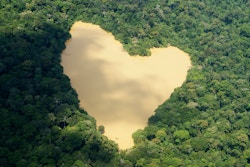The planet’s insects are being wiped out - but the rainforests can save us
The number of insects around the world is plummeting, and approaching total extinction fast. That would lead to a “catastrophic collapse of nature’s ecosystems”, according to the first global scientific review of insect population decline published this week in the journal Biological Conservation.

Insects are essential to vital, healthy ecosystems all over the world. Also here, in the rainforest of Colombia. Photo: Thomas Marent
The findings of the report illustrate why it is important to drastically strengthen protection of the world's large, contiguous forest areas.
Rainforests are the most biodiverse and species-rich ecosystem on land. Large intact rainforests, such as the remaining rainforests of the Amazon, Central Africa, and the island of New Guinea, are crucial to halting global loss of insects and other biodiversity.
The new report indicates catastrophic insect death also in the rainforest. There's no time to lose.
It's therefore time to really step up our game. If you’re in doubt, consider this: several studies have laid out the threat climate change poses to the coffee industry. A warmer climate not only brings drought and insufferable temperatures but is likely also killing off large numbers of the insects that pollinate coffee plants.
One main driver: habitat loss
The review, published this week in the journal Biological Conservation points to one main driver of species decline: habitat loss and conversion to intensive agriculture and urbanization.
In other words; the razing of pristine forests to make way for monoculture palm oil plantations in Indonesia, for rearing cattle or planting of soybeans in Brazil, the building of roads or mega dams across the Amazon and a number of other activities that serve to make modern life more prosperous and convenient.
We now know that not only do these activities often displace and impoverish indigenous communities who live there, but it also kills off the insects we needed to maintain life on earth for us all.
The review also shows that climate change is among the most important threats to the insect populations in the tropics.
The protection and conservation of large contiguous rainforests that can withstand the climate changes that are already well underway is crucial to maintaining healthy, viable insect populations and other species that are part of the forests’ complex web of life.
Only that way can the world hope to achieve the necessary climate change goals it set for itself through the Paris climate change accords in 2015.
There are solutions and they hold multiple benefits
The report points to an important part of the solution: "A rethinking of current agricultural practices, in particular a serious reduction in pesticide usage and its substitution with more sustainable, ecologically-based practices is urgently needed to slow or reverse current trends, allow the recovery of declining insect populations and safeguard the vital ecosystem services they provide."
Norway is one of those countries making an important international effort to protect the world’s rainforests through its International Climate and Forest Initiative.
The dramatic report published by the journal Biological Conservation clearly shows us that such initiatives must be stepped up and be more closely interlinked with other parts of development policy - especially business development and the agricultural sector.
Rich nations must take a leading role by paying for the conservation of global natural values and critical ecosystems.
Rainforest countries can contribute to- and benefit greatly from- better protection of their natural resources and the biodiversity needed to maintain them.
Indigenous and forest peoples live in, and depend on, the rainforests of the world. Lots of research and experience shows that their ways of life and interaction with the forests represent the most effective and sustainable models for protecting them.
When a new global agreement for the conservation of biological diversity- often referred to as «a new deal for nature»- is to be hashed out at the United Nations convention’s COP15 in Beijing in 2020, donor and rainforest nations alike must seize the opportunity to show leadership.
This is a matter of global security – and of the highest order.
